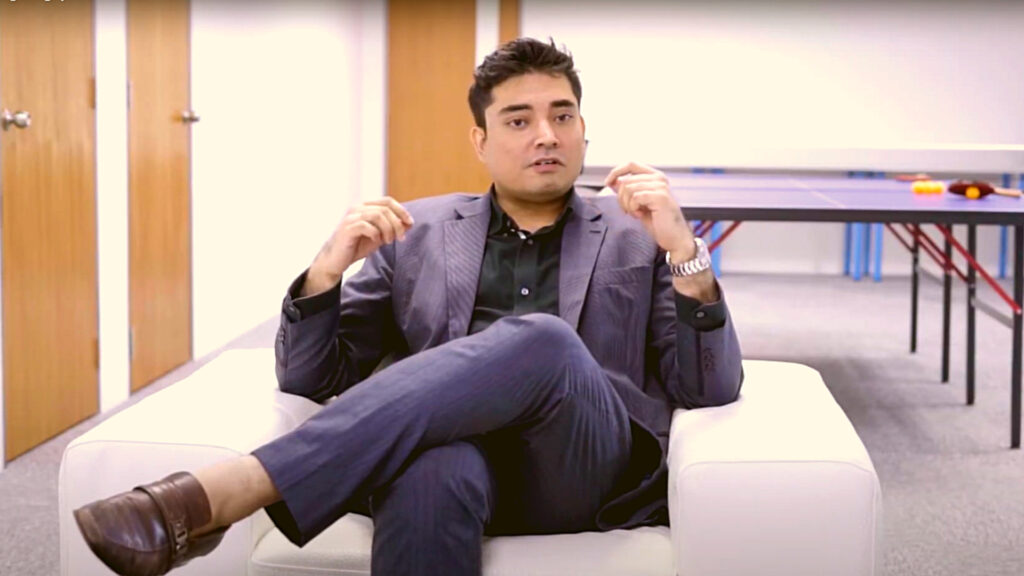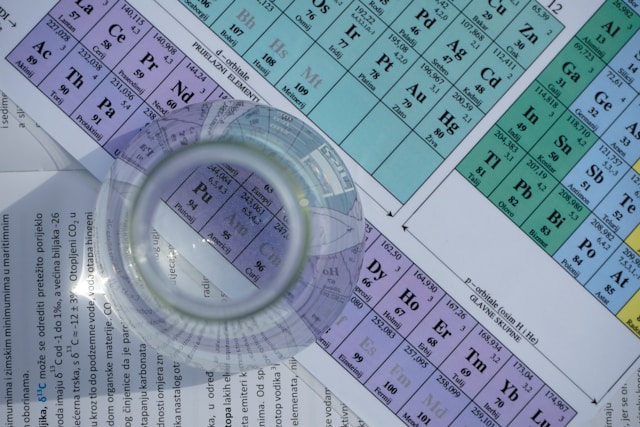Meet Sancy Suraj, the memory marvel who has set multiple records for his exceptional memory skills. From reciting the most pi digits to identifying all elements of the periodic table in record time, Sancy’s feats have amazed people worldwide. As the editor of this magazine, I had the opportunity to interview Sancy about his journey towards developing such an incredible memory.
In this article, we will explore Sancy’s process for memorizing the periodic table, his techniques for memorizing different types of information, and his advice for those looking to improve their memory skills. We will also discuss how Sancy has used his memory skills in his personal and professional life, his thoughts on whether exceptional memory skills are innate or can be developed, and his goals for the future.

What inspired you to start developing your memory skills, and how did you first become interested in memorizing the periodic table?
Growing up, I was always intrigued by the power of the human mind and how it could retain and recall information. As a child, I enjoyed playing games that involved memory, and I was naturally good at them. However, it wasn’t until I was in my early twenties that I discovered my passion for memory techniques and developing my memory skills.
I was introduced to the world of memory sports by a friend who had attended a memory workshop. I was fascinated by the techniques that were being taught and the possibilities of what could be achieved through memory training. I began to read books and attend workshops on the subject, and I became increasingly interested in developing my own memory skills.
As I explored the world of memory techniques, I discovered the periodic table, and it quickly captured my attention. The structure and organization of the elements appealed to my logical mind, and I saw it as the ultimate memory challenge. I began to study the periodic table in-depth, creating visual associations for each element and memorizing their properties and characteristics.
Over time, my passion for memory training grew, and I began to set my sights on breaking memory records. I spent countless hours practicing and refining my memory techniques, and eventually, I set my first record for the most digits of pi recited from memory. But it was the periodic table record that I really wanted to break, and with dedication and persistence, I was able to do so, setting a new Singapore record for the fastest time to recite the periodic table.
Overall, my passion for developing my memory skills and the challenge of memorizing the periodic table have been driving forces in my life, and I am excited to continue exploring the possibilities of what can be achieved through memory training.
Can you walk us through your process for memorizing the periodic table, from selecting a memory technique to practicing and reviewing the information?
My process for memorizing the periodic table involved several different memory techniques and strategies. The first step was to create visual associations for each element, which helped me to remember the element’s atomic number, symbol, and name. I would often create a mental image of the element based on its name or symbol, such as imagining a picture of a sulfuric dragon for the element sulfur or picturing a neon sign for neon.
Once I had created visual associations for all of the elements, I used a memory palace technique to memorize the order of the periodic table. This involved imagining a familiar location, such as my childhood home or a route that I frequently travel, and placing each element in a specific location within that location. For example, I might place hydrogen in the kitchen, helium in the living room, and so on.
I would then mentally walk through the memory palace, visualizing each element in its designated location and reciting its atomic number, symbol, and name. I found that the more vivid and memorable the visual association, the easier it was for me to recall the information.
To practice and review the information, I would regularly recite the periodic table from memory, starting at a random element and reciting the elements in order from there. I would also use flashcards to quiz myself on the atomic numbers and symbols of the elements, which helped me to reinforce my knowledge and identify any areas that needed more work.
Overall, my process for memorizing the periodic table involved a combination of visual associations, memory palace techniques, and regular practice and review. By using these strategies, I was able to memorize the periodic table quickly and accurately, and eventually set a new Singapore record for the fastest time to recite the periodic table.
Were there any particular elements or groups of elements that were particularly challenging to memorize, and how did you overcome these challenges?
As I was memorizing the periodic table, I did encounter some elements and groups of elements that were more challenging to remember than others. One of the most difficult groups was the transition metals, which are located in the middle of the periodic table and have a variety of different properties and uses.
To overcome this challenge, I used a technique called chunking, which involves grouping information into smaller, more manageable chunks. I divided the transition metals into smaller groups based on their properties, such as their oxidation states or electron configurations. This helped me to remember them more easily and also allowed me to associate them with other elements in the same group.
Another group of elements that was challenging to memorize was the lanthanides and actinides, which are located at the bottom of the periodic table and have complex electronic configurations. To remember these elements, I used a technique called the method of loci, which involves associating each element with a specific location in a familiar place.
For example, I associated the element europium with the Eiffel Tower, as both had the same initial letter. I would then visualize the element in that location and recite its properties, such as its atomic number and symbol. This technique helped me to remember the lanthanides and actinides more easily and also made the process more enjoyable.
Finally, some individual elements were also more challenging to remember than others, such as elements with similar properties or names. To overcome this challenge, I created visual associations and used repetition to reinforce my knowledge. I also sought out online resources and textbooks to learn more about the properties and uses of each element, which helped me to develop a deeper understanding of the periodic table as a whole.
In the end, overcoming these challenges required a combination of creativity, persistence, and a willingness to try new techniques and strategies. By adapting my approach as needed and using a variety of different memory techniques, I was able to memorize the periodic table and achieve a new Singapore record.
“Challenges are opportunities to enhance our learning and memory skills. By using a combination of creativity, persistence, and effective memory techniques, we can overcome even the most difficult of obstacles and achieve our goals.”
In addition to memorizing the periodic table, you’ve also set records for memorizing pi digits and other information. How do you approach memorizing different types of information, and do you have different techniques or strategies for different types of information?
Yes, in addition to memorizing the periodic table, I have set records for memorizing pi digits and other types of information. To approach memorizing different types of information, I use a variety of techniques and strategies, depending on the nature of the information and the amount of information I need to remember.
For example, when memorizing pi digits, I use a technique called the Dominic System, which involves associating numbers with specific images or people. This allows me to create memorable and unique visual associations for each digit, which makes it easier to remember long strings of numbers.
When memorizing larger amounts of information, such as historical facts or vocabulary words, I use a technique called the memory palace or method of loci. This involves associating each piece of information with a specific location in a familiar place, such as a childhood home or a favorite park. By visualizing each piece of information in its designated location, I can remember it more easily and also recall it in the correct order.
I also use repetition and practice to reinforce my memory of different types of information. By reviewing the information multiple times over a period of days or weeks, I can solidify my knowledge and ensure that it stays fresh in my mind.
Overall, my approach to memorizing different types of information is to adapt my techniques and strategies based on the specific nature of the information. By using a combination of visual associations, repetition, and practice, I am able to achieve high levels of memorization and set new records in memory competitions.
What advice would you give to someone who wants to improve their memory skills, but doesn’t know where to start?
If someone wants to improve their memory skills but doesn’t know where to start, my first piece of advice would be to start small and be consistent. Memory is like a muscle – the more you exercise it, the stronger it becomes. So, start with simple memory exercises like remembering a grocery list or a phone number, and gradually build up to more complex information.
Another important tip is to find a memory technique that works best for you. There are many different techniques available, such as the method of loci, the peg system, or the Major System. Experiment with different techniques and see which one works best for you and the type of information you want to remember.
I would also recommend breaking down complex information into smaller, more manageable chunks. For example, when memorizing a long list of items, try to group them into categories or create a story that ties them all together. This can help make the information more meaningful and easier to remember.
Finally, it’s important to practice regularly and review the information frequently. Repetition is key to strengthening your memory, so make sure to revisit the information multiple times over a period of days or weeks.
In summary, improving memory skills requires consistent practice, finding the right memory techniques, breaking down information into smaller chunks, and regular review. With dedication and patience, anyone can improve their memory skills and achieve impressive results.
“Memory is like a muscle – the more you exercise it, the stronger it becomes. Start small, find the right technique for you, break down information into manageable chunks, and practice regularly. With time and effort, anyone can improve their memory skills and achieve great results.”
In response to the first question, Sancy explains that his memory technique for memorizing the periodic table involves associating each element with a unique image, using a mnemonic system called the “Major System.” He developed this technique through research and practice, which has allowed him to memorize the periodic table in a mere 19.78 seconds.
When asked about his training regimen in question 1.3, Sancy emphasizes the importance of consistent practice and training the mind like a muscle. He recommends daily exercises to enhance memory skills and offers tips on developing a routine to achieve optimal results.
Sancy walks us through the process of memorizing and reciting the periodic table in question 1.4, highlighting the importance of visualization and the use of vivid imagery to aid recall. He also shares his personal experience of competing in memory tournaments and how he prepares mentally and physically for such events.
For those starting to develop their memory skills, Sancy offers practical advice in question 1.5, encouraging a positive mindset and regular practice. He dispels common misconceptions about memory techniques and offers encouragement to those beginning their memory journey.
Sancy addresses common challenges and how to stay focused and motivated during long periods of memorization and recall in question 1.7. He shares his personal tips on how to maintain focus, discipline and motivation to achieve his memory goals.
When asked about how his memory training has affected his life, Sancy reflects on the positive impact it has had on his personal and professional relationships in question 1.8. He shares how his memory skills have helped him in his career as an IT professional and how it has improved his overall quality of life.

Have you ever used your memory skills in other areas of your life, such as studying or work? How have your memory skills helped you in these areas?
Yes, my memory skills have been incredibly useful in other areas of my life, such as studying and work. In fact, it was my interest in improving my academic performance that first led me to explore memory techniques and develop my memory skills.
In my academic pursuits, I have used memory techniques to help me remember important information for exams and presentations. For example, I have used the method of loci to remember historical timelines, and the Major System to remember mathematical formulas. By using these techniques, I was able to recall the information quickly and accurately, which helped me achieve better grades and perform well on assignments.
In my work as a memory coach, my memory skills have been invaluable in helping me remember the names and personal details of my clients. This has helped me establish stronger connections with my clients and provide more personalized coaching.
Additionally, my memory skills have helped me in my personal life as well. I have used memory techniques to remember important dates, such as birthdays and anniversaries, and to remember details about people I meet. This has helped me build stronger relationships with friends and family.
Overall, developing my memory skills has had a positive impact on many aspects of my life, from academic and professional pursuits to personal relationships. It has allowed me to perform at a higher level and connect with others in a more meaningful way.
Do you believe that anyone can develop exceptional memory skills, or do you think that there are certain innate qualities or characteristics that are necessary?
I strongly believe that anyone can develop exceptional memory skills with the right training and practice. While some people may have a natural aptitude for memorization, I believe that memory is a skill that can be improved and developed through deliberate practice and the use of effective memory techniques.
In my experience as a memory coach, I have worked with individuals from all walks of life, with varying degrees of natural memory ability. I have seen firsthand how people can make significant improvements in their memory skills with consistent practice and the use of memory techniques.
It is true that some individuals may find certain memory techniques more effective than others, depending on their individual learning style and preferences. However, I believe that anyone can find a memory technique that works for them with enough experimentation and practice.
In addition, I believe that mindset plays a crucial role in developing exceptional memory skills. A growth mindset, where individuals believe that their abilities can be improved through effort and perseverance, can be a powerful motivator for individuals to work on improving their memory skills.
Overall, I believe that developing exceptional memory skills is possible for anyone, regardless of their innate qualities or characteristics. With the right mindset, training, and practice, anyone can improve their memory and achieve impressive feats of memorization.
How do you balance practicing and honing your memory skills with other aspects of your life, such as work or hobbies?
Balancing my memory training with other aspects of my life can be challenging, but I have developed some strategies that have helped me stay focused and productive in all areas of my life. First and foremost, I prioritize my commitments and make sure that I allocate enough time for each of my activities. For instance, I allocate specific hours for my work and my memory training, and I stick to these schedules as much as possible.
Another important strategy is to set realistic goals and expectations for myself. I try to be mindful of my limits and avoid over-committing myself to avoid feeling overwhelmed or burnt out. This means that I set achievable goals for my memory training, and I don’t try to cram too much information into one training session.
To make sure that I am making the most of my practice time, I also try to focus on quality over quantity. I have found that practicing memory techniques for shorter periods of time with intense focus and attention is more effective than practicing for longer periods of time with less focus.
Finally, I try to find ways to integrate my memory training into my daily life. For example, I might use memory techniques to remember phone numbers or important dates, or I might practice memorizing lists of items during my daily commute. By incorporating memory training into my daily routine, I am able to stay consistent with my practice without sacrificing other aspects of my life.
Overall, finding balance between my memory training and other aspects of my life requires discipline, prioritization, and mindfulness. But with the right strategies and a commitment to consistency, I am able to make progress in my memory training while still enjoying my other hobbies and responsibilities.
What’s next for you in terms of memory-related goals or accomplishments? Are there any particular records or feats that you’re working towards?
As someone who is passionate about memory techniques and the science of memory, I’m always on the lookout for new challenges and opportunities to push the boundaries of what I can achieve. While I’m incredibly proud of the records I’ve set for memorizing pi digits and the periodic table, I know that there is always room for improvement and growth.
Currently, I’m exploring new ways to apply my memory skills to different fields, such as medicine and law. I believe that my ability to quickly and accurately recall information could be extremely valuable in these areas, and I’m excited to see how I can use my skills to make a positive impact.
In terms of specific records or feats that I’m working towards, I’m always looking for new challenges to take on. One goal that I have in mind is to memorize the entire Oxford English Dictionary, which contains over 600,000 words. This would be an enormous undertaking, but I believe that it’s possible with the right techniques and training.
Ultimately, my goal is not just to set records or achieve feats for the sake of recognition, but to continue to deepen my understanding of memory and help others unlock their own potential. I hope to inspire others to explore the fascinating world of memory techniques and discover the amazing things that they are capable of.
Finally, what message do you hope to convey to others through your memory achievements and expertise? What impact do you hope to have on the world of memory and beyond?
Through my memory achievements and expertise, I hope to inspire others to realize the incredible potential of their own minds. We all have the capacity for exceptional memory skills, and I believe that by sharing my own experiences and techniques, I can help others unlock this potential. Memory is a skill that can be developed and improved over time with practice, dedication, and the right strategies, and I hope to motivate others to embark on their own journeys of memory improvement.
Beyond the world of memory, I hope to demonstrate the power of the human mind and inspire people to explore and expand their intellectual abilities. Memory is just one aspect of the vast capabilities of our brains, and I believe that by pushing ourselves to explore new intellectual horizons, we can achieve great things and make meaningful contributions to the world. Whether it’s through scientific discoveries, artistic creations, or other intellectual pursuits, we all have the potential to make a positive impact on the world, and I hope to inspire others to pursue their passions with dedication and enthusiasm.
In addition, I hope to show that memory skills can have practical applications in various fields, from education and research to business and everyday life. Improved memory can enhance our learning abilities, boost productivity, and help us make more informed decisions, among many other benefits. By showcasing the practical applications of memory skills, I hope to encourage more people to invest in developing their own memory abilities and to recognize the value of memory as a vital aspect of our cognitive toolkit.
Overall, I hope to convey a message of empowerment, encouraging people to believe in their own potential and to pursue their intellectual passions with confidence and determination. Through my memory achievements and expertise, I hope to inspire others to push the boundaries of what is possible and to discover the incredible capacity of their own minds.
“Believe in the power of your mind, and unlock the limitless potential within. With dedication, practice, and the right strategies, you can achieve extraordinary feats and make a positive impact on the world.”
Sancy discusses his future plans and memory challenges in question 1.9, expressing his desire to push the boundaries of what is possible with the human mind and memory. He also encourages others to pursue their own memory goals and to continue to learn and grow.
Finally, in question 1.10, Sancy shares his message to those interested in developing their memory skills or setting their own records. He emphasizes the importance of consistency, hard work, and perseverance in achieving memory goals, while also encouraging individuals to enjoy the process and have fun along the way.
In conclusion, Sancy Suraj is an inspiring figure in the world of memory sports, with his impressive accomplishments and dedication to his craft. His techniques and tips offer valuable insight into the world of memory training and the possibilities that exist with the human mind.










